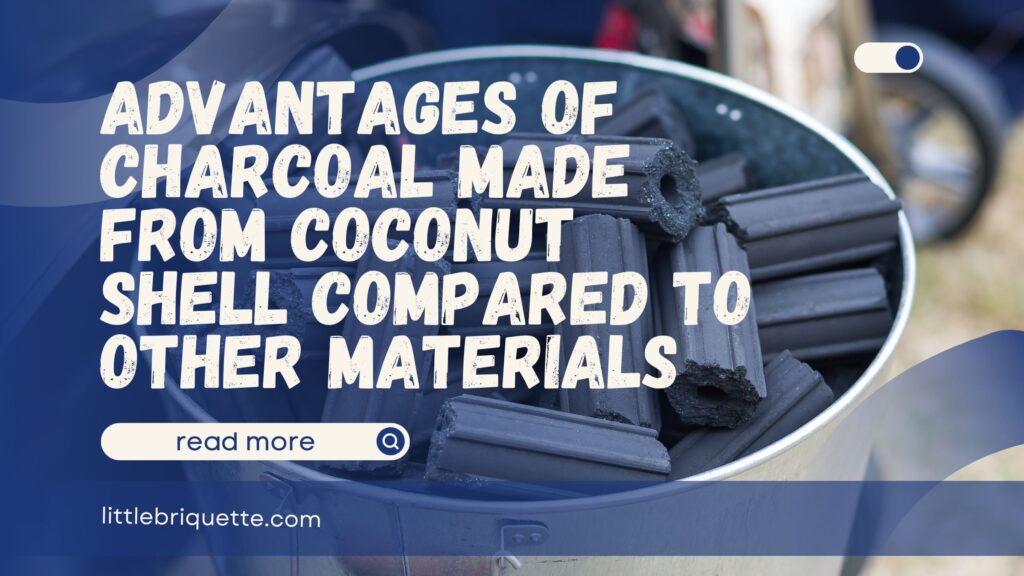Charcoal made from coconut shell is a natural material that offers numerous benefits. Its versatility lies in its potential to improve the environment, support sustainable agriculture, enhance health, and even find applications in the food industry. Coconut charcoal is not only an eco-friendly alternative for fuel and waste processing but also serves as a raw material in the production of chemicals and pharmaceuticals.
Advantages of Charcoal Made from Coconut Shell Compared to Other Materials
Coconut charcoal possesses several significant advantages compared to charcoal from wood and synthetic activated carbon. Here are some detailed comparisons:
Advantages Compared to Wood Charcoal

Charcoal made from coconut shell offers several significant advantages over wood charcoal. Firstly, the raw material for making coconut charcoal comes from abundant coconut industry waste, significantly reducing pressure on forests and the natural environment. The process of making charcoal from wood often involves tree felling, which can lead to deforestation and wildlife habitat degradation. In contrast, using coconut shells as a raw material not only recycles industrial waste but also supports sustainable agricultural practices by efficiently utilizing existing resources.
Secondly, physically, charcoal made from coconut shell is generally denser and harder compared to wood charcoal. This denser structure makes it more durable and effective in applications requiring high absorption capacity, such as water and air purification. Additionally, coconut charcoal has larger and more porous pores, allowing it to absorb chemicals and pollutants more efficiently than wood charcoal. Therefore, in terms of environmental sustainability and technical application efficiency, coconut charcoal consistently demonstrates superiority over traditional wood charcoal.
Charcoal Made form Coconut Shell vs Synthetic Activated Carbon

Coconut charcoal offers several clear advantages over synthetic activated carbon. Firstly, coconut shell charcoal is derived from renewable natural resources, specifically coconut industry waste, making it more environmentally friendly compared to synthetic activated carbon often derived from petroleum-based chemicals. The use of coconut shell charcoal supports waste recycling practices and reduces overall carbon footprint, aligning with global efforts to mitigate greenhouse gas emissions.
Secondly, economically, coconut charcoal tends to be more cost-effective to produce compared to synthetic activated carbon. The manufacturing process of coconut charcoal is relatively simple and utilizes readily available raw materials, namely coconut industry waste. This reduces production costs and makes coconut charcoal a more affordable choice, especially for industries or applications requiring large quantities of adsorbent material.
Therefore, coconut charcoal not only provides an effective solution for water treatment, air purification, or pharmaceutical applications but also supports environmental sustainability and more economically sustainable aspects compared to synthetic activated carbon.
Sustainability and Economic Advantages of Coconut Shell Charcoal Utilization
The use of charcoal made from coconut shell offers significant benefits in terms of sustainability and economics. From a sustainability perspective, coconut charcoal is derived from abundant coconut industry waste that, if not optimally utilized, could pose environmental challenges. By transforming this waste into charcoal, not only is waste reduced but it also adds economic value to coconut farmers and processing industries. The production process of coconut charcoal also requires less energy compared to synthetic activated carbon production, thereby reducing carbon footprint and aiding in greenhouse gas emission reduction.
Moreover, due to its recyclable nature, this type of charcoal supports a more sustainable economic cycle, providing affordable and sustainable raw materials for various industrial applications. Economically, the use of coconut charcoal can offer significant cost advantages compared to synthetic activated carbon. Its production process is relatively straightforward and utilizes readily available raw materials such as coconut shell waste. This reduces production costs and makes the selling price of coconut shell charcoal more competitive.
Furthermore, coconut charcoal can be applied across diverse industries including water treatment, food industry, and healthcare applications, enhancing market potential and revenue for products utilizing this charcoal. By combining these aspects of sustainability and economic advantages, the use of coconut charcoal not only provides effective solutions across various industrial applications but also supports sustainable economic growth and positively impacts the environment.
Also read: Dynamics of Coconut Charcoal Price in the Modern Market
Benefits of Coconut Shell Charcoal in Various Fields
Charcoal made from coconut shell has benefits across various fields. Here are some wonders and benefits of it:
Usage in Agriculture and Plantation

Coconut charcoal is used as an organic soil conditioner due to its ability to improve soil structure and water retention. Its large pores facilitate good air circulation and harbor microorganisms that support soil health. Additionally, coconut shell charcoal can store soil nutrients and release them gradually to plants, thereby enhancing overall agricultural productivity.
Food Industry

In the food industry, charcoal made from coconut is used for water purification and filtration. Its large pore structure is highly effective in adsorbing chemicals and purifying water from organic and inorganic contaminants. Moreover, coconut shell charcoal is used in food processing as an additive to remove undesirable tastes and odors from food and beverages.
Beauty and Health Sector

In the health and beauty sector, coconut charcoal is popular as a natural facial cleanser. Its ability to absorb oil and dirt makes it effective in deep cleansing the skin without harsh chemicals. Additionally, coconut charcoal is used in traditional medicine to alleviate digestive disorders and as an adsorbent to treat poisoning.
Environmental Use of Charcoal Made from Coconut Shell

In an environmental context, coconut charcoal can be used to control pollution and contamination. For instance, charcoal can be employed in wastewater filtration systems to remove harmful substances before they are discharged into the environment. Furthermore, coconut shell charcoal is an environmentally friendly alternative in fuel applications, both as domestic fuel and in alternative energy production processes like biochar.
Overall, coconut charcoal offers multifunctional solutions that not only enhance human quality of life across various fields but also support sustainable and environmentally friendly practices. With its broad and effective applications, coconut charcoal exemplifies how natural materials can be maximized for the benefit of both humans and the environment.
The Best Coconut Charcoal Briquette Supplier in Indonesia
Coconut charcoal offers significant advantages and benefits across various fields, and high-quality charcoal ensures a superior experience. For top-quality coconut shell charcoal briquettes, you can contact Little Briquette at this number.

